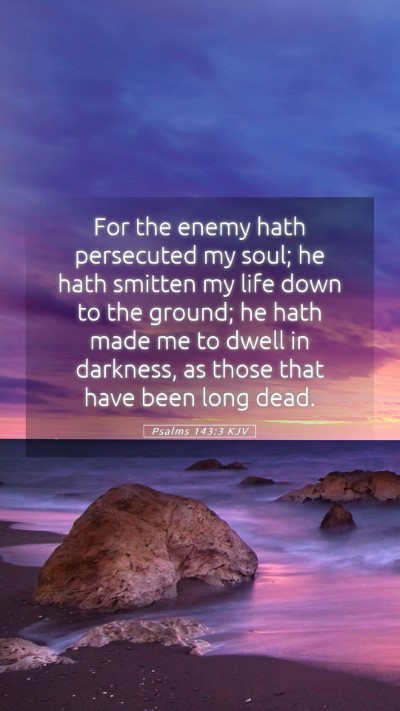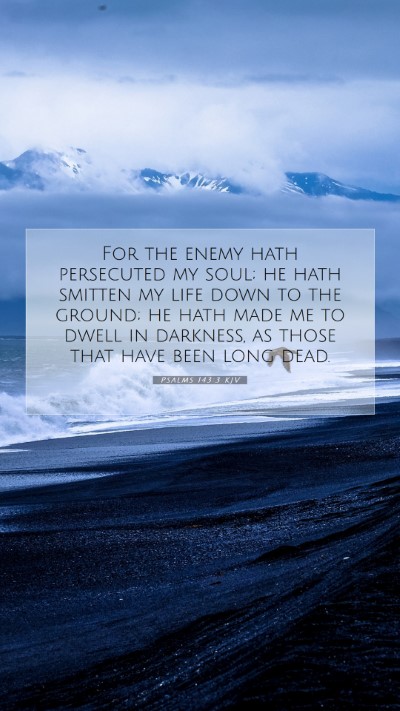Understanding Psalms 143:3 - A Comprehensive Bible Verse Commentary
Psalms 143:3 states, "For the enemy hath persecuted my soul; he hath smitten my life down to the ground; he hath made me to dwell in darkness, as those that have been long dead." This verse expresses a deep state of despair and distress faced by the psalmist. Below, we explore its meaning and significance through the lens of public domain commentaries.
Overview of Psalms 143:3
The context of Psalms 143 reveals a supplication to God in a time of trouble. The psalmist feels surrounded by enemies and is experiencing profound spiritual and emotional pain.
Key Themes
- Persecution and Distress: The mention of persecution indicates the psalmist's feeling of being hunted, which is a common theme in the Psalms.
- Despair: The references to being in darkness and feeling as if dead highlight a deep emotional turmoil.
- Desire for Divine Intervention: The verse serves as a cry for help, indicating the need for divine restoration.
Commentary Insights
Let's explore the insights from notable commentaries:
Matthew Henry's Commentary
Matthew Henry points out that the psalmist, feeling pursued by his enemies, is not only referring to physical foes but to spiritual and emotional adversities. He emphasizes that the 'soul' signifies both spirit and emotional state, indicating holistic suffering. Henry notes that the enemy’s pursuits can lead believers into a deep sense of isolation and darkness, akin to being among the dead.
Albert Barnes' Notes
Albert Barnes focuses on the effects of persecution on the believer’s spirit. He elaborates on how the 'enemy' symbolizes any force working against God's purpose in the believer’s life. Barnes emphasizes that this verse depicts the torment of the soul, showing how external pressures can lead individuals into a state of deep spiritual darkness. He suggests that recognizing such moments of distress is essential for seeking God’s light and restoration.
Adam Clarke's Commentary
Adam Clarke interprets the phrase 'he hath made me to dwell in darkness' as a symbol of despair that envelops the psalmist. Clarke connects the lament of the psalmist to a form of spiritual death, expressing how the weight of sin and despair can imprison one's soul. He encourages readers to understand that this longing for God’s presence amidst strife reflects a deep yearning for hope and redemption.
Interpretation and Application
Psalms 143:3 serves as a powerful reminder of the struggles of faith. It beckons believers to acknowledge their pain and seek God’s mercy during challenging times. Understanding this verse can provide comfort and guidance in moments of distress.
Significance for Believers
- It demonstrates that feeling overwhelmed by circumstances is a common human experience.
- The longing for God's intervention highlights the necessity of prayer and supplication in times of trouble.
- It reaffirms the belief in God’s capacity to bring light into the darkest situations.
Related Bible Verses
This verse relates closely to the following scripture passages:
- Psalm 34:19: "Many are the afflictions of the righteous: but the Lord delivereth him out of them all."
- Psalm 88:6: "Thou hast laid me in the lowest pit, in darkness, in the deeps."
- Isaiah 43:2: "When thou passest through the waters, I will be with thee; and through the rivers, they shall not overflow thee; when thou walkest through the fire, thou shalt not be burned; neither shall the flame kindle upon thee."
Conclusion
Psalms 143:3 dives deep into the human experience of suffering, encapsulating both physical and spiritual battles. Understanding this verse provides valuable insights into the nature of despair and the undeniable need for divine assistance. As we navigate our struggles, we are reminded of God's presence and capability to restore hope amidst darkness.
This in-depth interpretation serves not only as a commentary on this specific verse but as a broader tool for anyone involved in Bible study, whether personally or within study groups. For those looking to enhance their understanding of Scripture, considering these insights can be a profound way to embark on deeper Bible study and reflections on the nature of faith amid trials.


